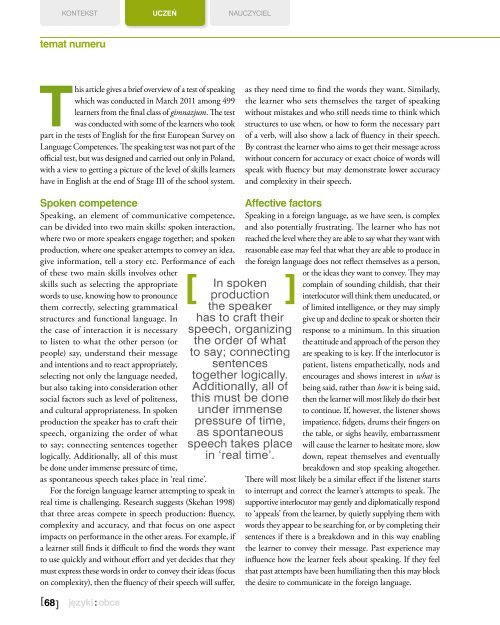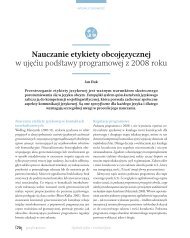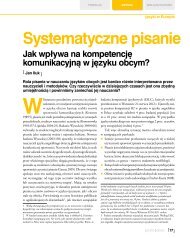0446-7965
temat numeru - JÄzyki Obce w Szkole
temat numeru - JÄzyki Obce w Szkole
- No tags were found...
Create successful ePaper yourself
Turn your PDF publications into a flip-book with our unique Google optimized e-Paper software.
kontekst<br />
uczeń<br />
nauczyciel<br />
temat numeru<br />
This article gives a brief overview of a test of speaking<br />
which was conducted in March 2011 among 499<br />
learners from the final class of gimnazjum. The test<br />
was conducted with some of the learners who took<br />
part in the tests of English for the first European Survey on<br />
Language Competences. The speaking test was not part of the<br />
official test, but was designed and carried out only in Poland,<br />
with a view to getting a picture of the level of skills learners<br />
have in English at the end of Stage III of the school system.<br />
as they need time to find the words they want. Similarly,<br />
the learner who sets themselves the target of speaking<br />
without mistakes and who still needs time to think which<br />
structures to use when, or how to form the necessary part<br />
of a verb, will also show a lack of fluency in their speech.<br />
By contrast the learner who aims to get their message across<br />
without concern for accuracy or exact choice of words will<br />
speak with fluency but may demonstrate lower accuracy<br />
and complexity in their speech.<br />
Spoken competence<br />
Speaking, an element of communicative competence,<br />
can be divided into two main skills: spoken interaction,<br />
where two or more speakers engage together; and spoken<br />
production, where one speaker attempts to convey an idea,<br />
give information, tell a story etc. Performance of each<br />
of these two main skills involves other<br />
skills such as selecting the appropriate<br />
words to use, knowing how to pronounce<br />
them correctly, selecting grammatical<br />
structures and functional language. In<br />
the case of interaction it is necessary<br />
to listen to what the other person (or<br />
people) say, understand their message<br />
and intentions and to react appropriately,<br />
selecting not only the language needed,<br />
but also taking into consideration other<br />
social factors such as level of politeness,<br />
and cultural appropriateness. In spoken<br />
production the speaker has to craft their<br />
speech, organizing the order of what<br />
to say; connecting sentences together<br />
logically. Additionally, all of this must<br />
be done under immense pressure of time,<br />
as spontaneous speech takes place in ‘real time’.<br />
For the foreign language learner attempting to speak in<br />
real time is challenging. Research suggests (Skehan 1998)<br />
that three areas compete in speech production: fluency,<br />
complexity and accuracy, and that focus on one aspect<br />
impacts on performance in the other areas. For example, if<br />
a learner still finds it difficult to find the words they want<br />
to use quickly and without effort and yet decides that they<br />
must express these words in order to convey their ideas (focus<br />
on complexity), then the fluency of their speech will suffer,<br />
[ 68 ]<br />
In spoken<br />
production<br />
the speaker<br />
has to craft their<br />
speech, organizing<br />
the order of what<br />
to say; connecting<br />
sentences<br />
together logically.<br />
Additionally, all of<br />
this must be done<br />
under immense<br />
pressure of time,<br />
as spontaneous<br />
speech takes place<br />
in ‘real time’.<br />
Affective factors<br />
Speaking in a foreign language, as we have seen, is complex<br />
and also potentially frustrating. The learner who has not<br />
reached the level where they are able to say what they want with<br />
reasonable ease may feel that what they are able to produce in<br />
the foreign language does not reflect themselves as a person,<br />
or the ideas they want to convey. They may<br />
complain of sounding childish, that their<br />
interlocutor will think them uneducated, or<br />
of limited intelligence, or they may simply<br />
give up and decline to speak or shorten their<br />
response to a minimum. In this situation<br />
the attitude and approach of the person they<br />
are speaking to is key. If the interlocutor is<br />
patient, listens empathetically, nods and<br />
encourages and shows interest in what is<br />
being said, rather than how it is being said,<br />
then the learner will most likely do their best<br />
to continue. If, however, the listener shows<br />
impatience, fidgets, drums their fingers on<br />
the table, or sighs heavily, embarrassment<br />
will cause the learner to hesitate more, slow<br />
down, repeat themselves and eventually<br />
breakdown and stop speaking altogether.<br />
There will most likely be a similar effect if the listener starts<br />
to interrupt and correct the learner’s attempts to speak. The<br />
supportive interlocutor may gently and diplomatically respond<br />
to ‘appeals’ from the learner, by quietly supplying them with<br />
words they appear to be searching for, or by completing their<br />
sentences if there is a breakdown and in this way enabling<br />
the learner to convey their message. Past experience may<br />
influence how the learner feels about speaking. If they feel<br />
that past attempts have been humiliating then this may block<br />
the desire to communicate in the foreign language.









